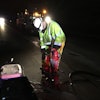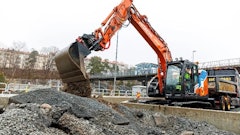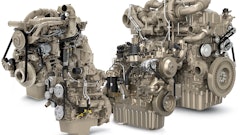
Ronald DeFeo is exasperated. Each day that Congress does not act on a multi-year transportation bill he grows more worried about the impact it will have on the nation's construction-equipment industry and the economy.
DeFeo, chairman and chief executive officer of Terex Inc., a Westport-based global construction equipment manufacturer, is joining the Association of Equipment Manufacturers and other organizations in urging Congress to approve a new six-year surface transportation programs bill.
"We have one highway bill every six years. Every time it comes up it gets politicized. It's an important bill for safety and jobs," said DeFeo, who heads a company that has seen its global employment drop from 22,000 to 16,000 in the past 15 months because of the recession.
Revenue of the top 12 global construction-equipment companies is down $24 billion or 40 percent for the first half of 2009 compared with last year, he said.
"We're watching our jobs go away. Fortunately, the majority of our contracts are outside the U.S. Fortunately, I'll survive. I planned for this. We have $940 million in cash on hand," said DeFeo, who spent last Thursday on Capitol Hill visiting legislators who represent states where Terex has operations.
In September, the House of Representatives past H.R. 3617, the "Surface Transportation Extension Act of 2009," a three-month extension of the federal highway, safety and transit programs, but the Senate followed it Sept. 30 with a 30-day extension.
U.S. Rep. James Oberstar, D-Minn., chairman of the House Committee on Transportation and Infrastructure, is pushing for a new $500 billion infrastructure bill supported by gasoline and diesel taxes.
The federal tax on gasoline of 18.4 cents per gallon has not changed since 1993, DeFeo said, contending that the condition of U.S. highways have suffered as a result. The tax on diesel fuel is 24.3 cents per gallon.
"We have a massive need to improve our infrastructure. Our highways have been given a 'D' rating by the U.S. Society of Civil Engineers," DeFeo said, charging that if the nation's highways are not improved, the economy will continue to suffer. "We won't have money to pay for health care if we don't get our economy going, and that depends on our roads."
The construction-equipment industry has lost 37 percent of its jobs since the economic downturn began, said Dennis Slater, president of the Association of Equipment Manufacturers.
"The industry is in a depression, not a recession," he said Friday. "The job losses in other sectors are indeed terrible -- auto manufacturing and dealership jobs are down 16 percent and the finance and insurance industries are down by 6 percent -- but a 37-percent job loss is devastating."
The American Highway Users Alliance, which represents truckers, bus companies, motorists, recreational vehicle enthusiasts and motorcyclists, Thursday said Congressional inaction on a new surface transportation programs bill is jeopardizing state highway projects.
"Using one hand to provide money for highways (in the federal economic stimulus bill) and then using the other hand to take funds back through cuts to traditional funding is a bait-and-switch that is hidden from the public. It will degrade our quality of life," said Greg Cohen, president and chief executive officer of the alliance. "In the long term, Congress needs to develop a stable, well-funded six-year highway bill that prevents theses types of crises from happening."Terex head presses Congress to act on road infrastructure















